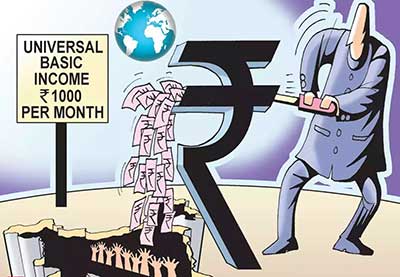Relevance: GS-2: Government policies and interventions for development in various sectors and issues arising out of their design and implementation
Key Phrases: Universal Basic Income, Economic Advisory Council to the Prime Minister, Leak-proof Direct Transfers, urban Job Guarantee, Sharing of Public Funds, Premature Welfarism, Severe Income Squeeze, Drive for Formalization
Why in News?
- The Economic Advisory Council to the Prime Minister recently released a report on inequality prepared by the Institute for Competitiveness.
- India’s debate on the need and feasibility of a universal basic income (UBI) as an elementary safety net for all our citizens except opt-outs has thus, got renewed.
Key Highlights
- Two suggestions from the report have caught attention having a broad focus on the nature of inequality and poverty in the country.
- It advocates fallback job options for urban Indians along the lines of the Mahatma Gandhi National Rural Employment Guarantee Scheme, which assures rural residents 100 days of pay-for-work each year for the asking.
- More significantly, the report also supports a UBI, an idea that is still seen as somewhat radical in policy circles.
Why is there a need for Universal Basic Income?
- Widening gap between rich and poor:
- Covid rescue involving a large fiscal-monetary expansion has led to an inflation-led widening of the outstanding gaps in the financial well-being of people.
- Inequality is a more complex problem than poverty, and it accentuates India’s need for an even more foundational safety net.
- Distress of Informal Sector:
- The brunt of the pandemic shock was borne by the poor with large numbers suffering a severe income squeeze.
- For our vast informal sector, it has been a deep curse.
- Modest earners had been hit hard by the drive for formalization a few years earlier, while an overall slowdown of India’s economy worsened the job scarcity that is yet to ease.
- To be sure, free food rations and job handouts played vital roles in offering the poor relief. But the distress has spanned multiple socio-economic classes.
- Credible reports suggest that even middle-class homes were pushed into penury.
Concept of Universal Basic Income:
- Universal basic income (UBI) is a government program in which every adult citizen receives a set amount of money regularly.
- The goals of a basic income system are to alleviate poverty and replace other need-based social programs that potentially require greater bureaucratic involvement.
Challenges associated:
- Huge cost to Exchequer:
- A UBI scheme would be too expensive.
- For about a billion beneficiaries, it would cost an annual ₹12 trillion just for each adult to get a monthly ₹1,000.
- But what looks like premature welfarism today could well be affordable tomorrow as the central exchequer expands, especially if we snip inefficient fiscal expenses and urge the non-needy to opt out.
- Eligibility Criteria:
- An eligibility cut-off is sure to be proposed, but a denial criterion could defeat its inclusivity and pose barriers to upward mobility at that level.
- Complacency of Workers:
- As for the worry of workers becoming lazy, an assured income would act as a belly-filler at best, so that should not deter an Indian UBI plan.
International Examples:
- In the US, a 2018 working paper on the behavioural effects of cash transfers found just a 1% drop in labour supply induced by a 10% income boost.
- Earlier research by Abhijit Banerjee and others, outlined in ‘Debunking the Stereotype of the Lazy Welfare Recipient’ had similar findings for emerging economies.
Way Forward:
- Even if UBI does induce some laziness, it would be a price worth paying. It’s time for a plan to share public funds with all citizens in need.
- We should aim to redesign redistribution, employ a digital rupee and give the concept a literal makeover.
- In times of hardship, practical objections raised by critics must not stand in the way of an urban job guarantee for the needy.
- For welfare efficiency, we should institute leak-proof direct transfers covering all adults.
Conclusion:
- Little is known of the government’s receptivity to these proposals, but they should both be on the Centre’s agenda for a good reason.
- Regardless of divisions in opinion over the reality and angularity of a ‘K-shaped’ recovery from covid, or over poverty levels in the country, inequality demands a bold policy response.
- In general, misgivings over a backward bend in an economy’s labour-supply curve caused by cash giveaways have been debunked by studies.
Source: Live-Mint
Mains Question:
Q. Examine the Concept of Universal Basic Income with its prospects and associated challenges in reducing the inequalities and distress of the poor. (250 words).























